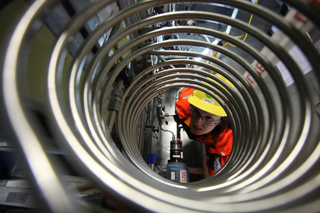Corn's second act: biobutanol
 Your fuel tank could be filled entirely by a corn product within a few years. A new drop-in biofuel replacement for gasoline, backed by BP and DuPont, is set to begin commercial production in 2014.
Your fuel tank could be filled entirely by a corn product within a few years. A new drop-in biofuel replacement for gasoline, backed by BP and DuPont, is set to begin commercial production in 2014.There is more corn grown in the United States used for ethanol fuel production than for livestock feed. Yet, ethanol arguably has a demand constraint: the so-called “blend wall,” and government subsidies are expiring.
Ethanol accounts for 10 percent of the U.S. fuel supply. E-10, a federal blending requirement, has become a standard. However, demand has hit a ceiling at 10 percent - the availability of E-85, a far richer blend, not withstanding.
It might sound like king corn is in trouble, but the reality is ethanol will live on. The Environmental Protection Agency could increase the requirement to 15 percent, and a rising federal alternative fuel mandate will guarantee future demand. There’s also an alternative path toward growth: biobutanol.
The benefit of using butanol is its impact on the manufacturing economics of refiners, said Butamax CEO, Paul Beckwith. Butanol is drop in fuel molecule that can be used in existing vehicles and fuel distribution infrastructure, he added.
That drop-in quality means that customers are prepared to pay more for it, Beckwith explained. “Biofuels and renewables can play a bigger role in terms of contribution towards the fuel supply in the USA, which at the moment, whilst significant, is limited by compatibility of vehicles and infrastructure.”
Butamax, a 50/50 joint venture between the aforementioned corporate giants, is preparing for what it believes will be a next generation product that ethanol plants can move onto. The company’s technology also works with sugar and cellulosic mass.
Today, it announced that a new biofuel refinery has joined its early adopters program. The program has a total capacity of 900 million gallons per year, respecting 7-8 percent of the total ethanol market.
Of course, none of its partners are producing anything - yet. They have merely expressed interest in retrofitting their existing ethanol production facilities once Butamax has proven commercial viability at its own facility.
The company isn’t the only biobutanol maker. Butamax has been embroiled in a series of lawsuits with its rival Gevo. Both companies have sued each other over intellectual property issues.
Butamax intends to break ground on its own commercial facility in 2014. An existing US$50 million facility in the United Kingdom was built to develop data and knowledge that’s necessary to go commercial. Hundreds of millions of dollars were invested to develop the technology, Butamax’s Beckwith said.
You can return to the main Market News page, or press the Back button on your browser.

